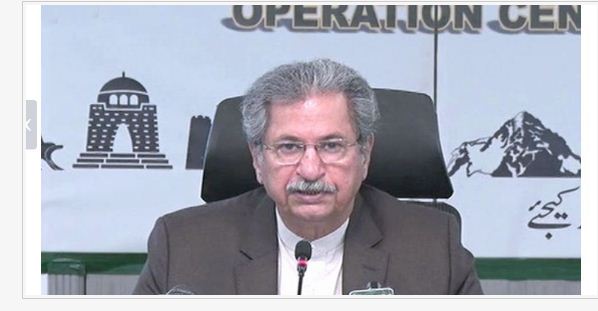ISLAMABAD, MAR 24 – Federal Minister for Education and Professional Training Shafqat Mahmood announced on Wednesday that educational institutes in areas with a high incidence of Covid-19, including Islamabad, will remain closed till April 11.
He made the announcement at a press conference after chairing a meeting at the National Command and Operation Centre (NCOC). The meeting was also attended by senior officials from the health and education department, and provincial education ministers.
Earlier this month, the NCOC had decided on a two-week spring vacation in educational institutions in 10 cities of Punjab, Khyber Pakhtunkhwa, Azad Kashmir and Islamabad from March 15 till March 28.
Shortly after today’s meeting ended, the provinces announced the areas where schools will remain closed.
Sindh announced that its schools will remain open as usual, with 50 per cent student attendance allowed.
Areas other than Islamabad where schools will remain closed:
Punjab
- Lahore
- Rawalpindi
- Gujranwala
- Gujrat
- Multan
- Faisalabad
- Sialkot
- Sargodha
- Sheikhupura
KP
- Peshawar
- Mardan
- Charsadda
- Swabi
- Kohat
- Lower Dir
- Malakand
- Swat
- Nowshera
- Buner
During the press conference, Mahmood said that the forum noted the high incidence of coronavirus cases in several districts of Punjab, KP and Azad Jammu and Kashmir. “However, the number of cases in Sindh, Balochistan and Gilgit-Baltistan is relatively low.
“Therefore, it was decided that educational institutions in selected areas, where restrictions were imposed previously, will continue to be closed till April 11,” he said, adding that this applied to schools, colleges, academies and universities alike.
Mahmood stated that the provincial governments will also decide if schools need to be closed down in other areas.
“As you know there were nine districts in Punjab [where schools were closed down], then another was added. We closed them in Peshawar and then eight other districts were added.”
He said that the provincial governments will take the necessary steps based on the numbers. “If they wish to call teachers and administrative staff, they can do so.”
The minister said that the forum will continue to review the country’s coronavirus outbreak. “We know that closing down schools has caused harm to children’s education, but we can’t risk their health.”
He reiterated that the provincial government will decide the areas where educational institutions will be closed, adding that the closure will last till April 11.
He said that board examinations will take place according to their timetable as giving students the “baseline” grade was no longer an option.
“We will also have a meeting with the Cambridge education board to see if we can move the exams forward,” he said, but refrained from making any further comments before the meeting.
On Sunday, Mahmood had said that the third wave was serious and required careful review, adding that the health of students, teachers and staff was the “primary consideration”.https://platform.twitter.com/embed/Tweet.html?dnt=false&embedId=twitter-widget-1&frame=false&hideCard=false&hideThread=false&id=1373674742847246337&lang=en&origin=https%3A%2F%2Fwww.dawn.com%2Fnews%2F1614325&siteScreenName=dawn_com&theme=light&widgetsVersion=e1ffbdb%3A1614796141937&width=550px
Pakistan’s Covid-19 cases have drastically risen in recent weeks, with the country reporting more than 3,000 virus cases for the past seven days straight. On Wednesday, 3,301 cases and 30 deaths were reported in the country.
Educational institutions in Sindh to remain open
Meanwhile, Sindh Education Minister Saeed Ghani said that all educational institutions across the province will remain open as usual.
“At present, the situation of coronavirus in Sindh is under control but if SOPs are not implemented, problems may arise,” a statement quoted him as saying.
Ghani said it was agreed in the NCOC meeting that no student would be promoted to any level without examinations this year.
He noted the number of coronavirus patients in Sindh was less than in Punjab and KP.
“Given the situation, we have decided that all educational institutions across Sindh will remain open as usual, but only 50 per cent children will be invited under SOPs,” he said.
He said all private and public educational institutions would be bound to fully implement SOPs and if any case of coronavirus was found in any institution, the school or college would be closed.
Regarding the schedule of examinations in the province, Ghani said all the examinations in Sindh would be conducted on time as per the decision and schedule of the steering committee of the education department.
10 cities placed under lockdown
On Monday, the NCOC had imposed further restrictions which will remain in force till April 11.
The NCOC, at its meeting, decided to impose broader lockdowns, with no mobility except for emergencies, in 10 cities where the positivity ratio was over 8pc. These cities included Islamabad, Lahore, Multan, Rawalpindi, Faisalabad, Bahawalpur, Hyderabad, Peshawar, Swat and Muzaffarabad.
According to the new policy, residents of the areas concerned will be informed about the duration of lockdown and will be suggested to store edible items. People will not be able to move freely, except for emergencies. Edible items will be provided at their doorstep, through online services.
These decisions will be reviewed during the centre’s next meeting on April 7.
The NCOC decided to close commercial activities by 8pm and ban all types of indoor gatherings — cultural, musical and religious. Two safe days per week will also be observed.
Inter-city public transport will operate at 50pc and rail service at 70pc capacity. Complete closure of amusement parks will be ensured and reduced presence will be observed in courts (city, district, high courts and Supreme Court). Stringent protocols for tourism will also be followed in Gilgit-Baltistan, Khyber Pakhtunkhwa, Azad Kashmir and other tourist places.

















